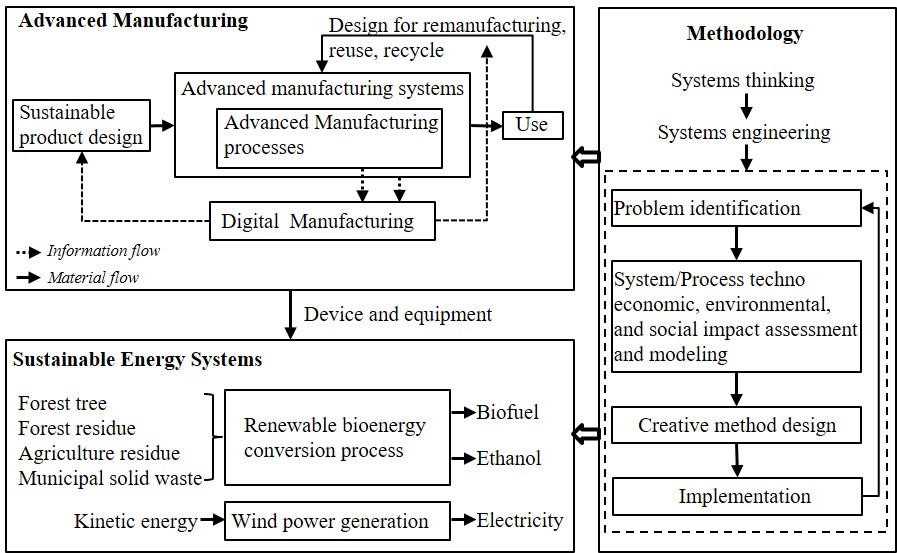Research
Research Themes
Dr. Zhang's research centers on using systems engineering methodologies to solve sustainability issues of manufacturing and industrial systems. There are two major themes, sustainability of advanced manufacturing and sustainable energy systems.

Advanced Manufacturing
The theme of my advanced manufacturing research is around sustainable design of product and manufacturing systems including novel modeling of advanced manufacturing, manufacturing process improvement, energy planning of manufacturing systems, and sustainable product design.
Novel modeling and design of advanced manufacturing systems: This research focuses on economic, environmental, and social impact modeling of advanced manufacturing systems with novel modeling methods (i.e. system dynamics). The model integrates systems engineering methodologies to depict manufacturing material flow, energy flow, and production behaviors with archetypes, and picture both short term and long term benefits from manufacturing decision scenarios. News1 News2
Additive manufacturing and biomimicry product design: High value material products (e.g. stainless steel, titanium, copper) suffer from high raw material cost and expensive end-of-life management plans. One solution for reducing cost and environmental impact is by designing high value parts with complex structure to reduce material use and meanwhile support the functionality of the part. However, machining complex geometry parts with traditional manufacturing processes faces tremendous challenge as it involves multiple processes and human intervention processing. Additive manufacturing (3D printing) provides a unique way to create such complex geometries without such difficulties. The objective of this cutting edge research is to investigate the biomimicry geometries for additive manufacturing product design and assess the functionality, economic, environmental, and social consequences from emerging additive manufacturing processes. Video
Energy planning of manufacturing systems: This research focuses on improving energy efficiency of production systems. Through energy audit and data analysis, this study will develop mathematical methods to improve or optimize energy consumption at machine level, process level, and plant level of the production system.
Sustainable design of products and for remanufacturing: Sustainable design seeks to reduce negative impacts on the environment, safety and health of products, thereby improving product performance. Sustainability assessment, including life cycle assessment, cost assessment and social impact assessment, will be integrated into design stage of the product. Sustainability metrics will also be developed for early design stage of product life cycle. Improving remanufacturing efficiency through design may increase the profitability of remanufacture, making a more viable and lucrative product end-of-life strategy.
Sustainable Energy Systems
The theme of my energy systems research is improving the sustainability (economic, environmental, and social aspects) of both conventional and renewable energy systems, through the development of techno-economic models of energy conversion pathways, integrated energy-environmental planning and forecasting, and energy sector occupational safety health practices.
Carbon analysis and environmental impact modeling of energy systems: This area focuses on the development of environmental models, which will project energy use, greenhouse gas emissions, and other environmental impacts (i.e., water depletion, abiotic depletion, acidification) over short term and long term horizons. Methods and tools used in this research include life cycle assessments with GREET, SimaPro, GaBi, OpenLCA, and system dynamics modeling (SD). The result of this research will be able to assess GHG mitigation practices in energy supply sectors, improve energy efficiency, implement renewable energy, and develop advanced energy conversion pathways. This will assist both state-wide and nation-wide policy formulation for government as well as investment decisions for industry. Example projects that I have worked on (or involved) include traditional brands of crude oil, new bitumen extraction technologies, lingocellulosic biomass to biofuel pathways, municipal solid waste (MSW) gasification to biofuel and electricity pathways, and oxymethylene ether synthesis from biomass pathways.News
Techno-economic models of energy systems: The aim of this research is to investigate the technical viability and economic competitiveness of various energy production pathways. The models will include detailed energy and mass balances of unit operations involved in energy product processing through their entire life cycles - from material extraction to end of life. Fossil fuels can be potentially replaced by multiple renewable sources. As current research and industrial applications are limited in this area, this research will make a significant impact on finding economic and environment-friendly renewable energy alternatives.
Life cycle sustainability assessment of energy technologies: Sustainable development of energy systems is becoming increasingly more important for policy and decision makers worldwide. Meeting new policy targets requires consideration and integration of all three sustainability aspects of energy systems: economic, environmental, and social. The above two research areas address economic and environmental aspects of sustainability. The social sustainability of energy systems research focuses on assessing and improving systems safety and health in energy production sectors. System methodologies (correlating to OSHA standards) can be utilized to develop energy occupational practices to reduce the risk of hazardous exposure, human fatigue, and ensure workplace safety. In order to provide a comprehensive evaluation of technologies, a decision support method based on a life cycle approach is needed to enable assessments at both technology and system levels.
Application on biomass energy conversion: Biomass harvested from municipal solid waste, forest whole tree, forest residues, and agriculture residues can be reprocessed to produce other energy forms such as biodiesel, by upgrading of biomass burning syngas, and electricity from gas engine or gas turbine. Challenges in this area include low efficiency of gasification of biomass, cleaning of syngas, high cost and environmental impact of harvesting and transportation, and emission control of electricity generating systems. Industry cases are limited in such processes. My research will help industry and government make investment decisions by assessing the techno-economic and environmental viability of such pathways.